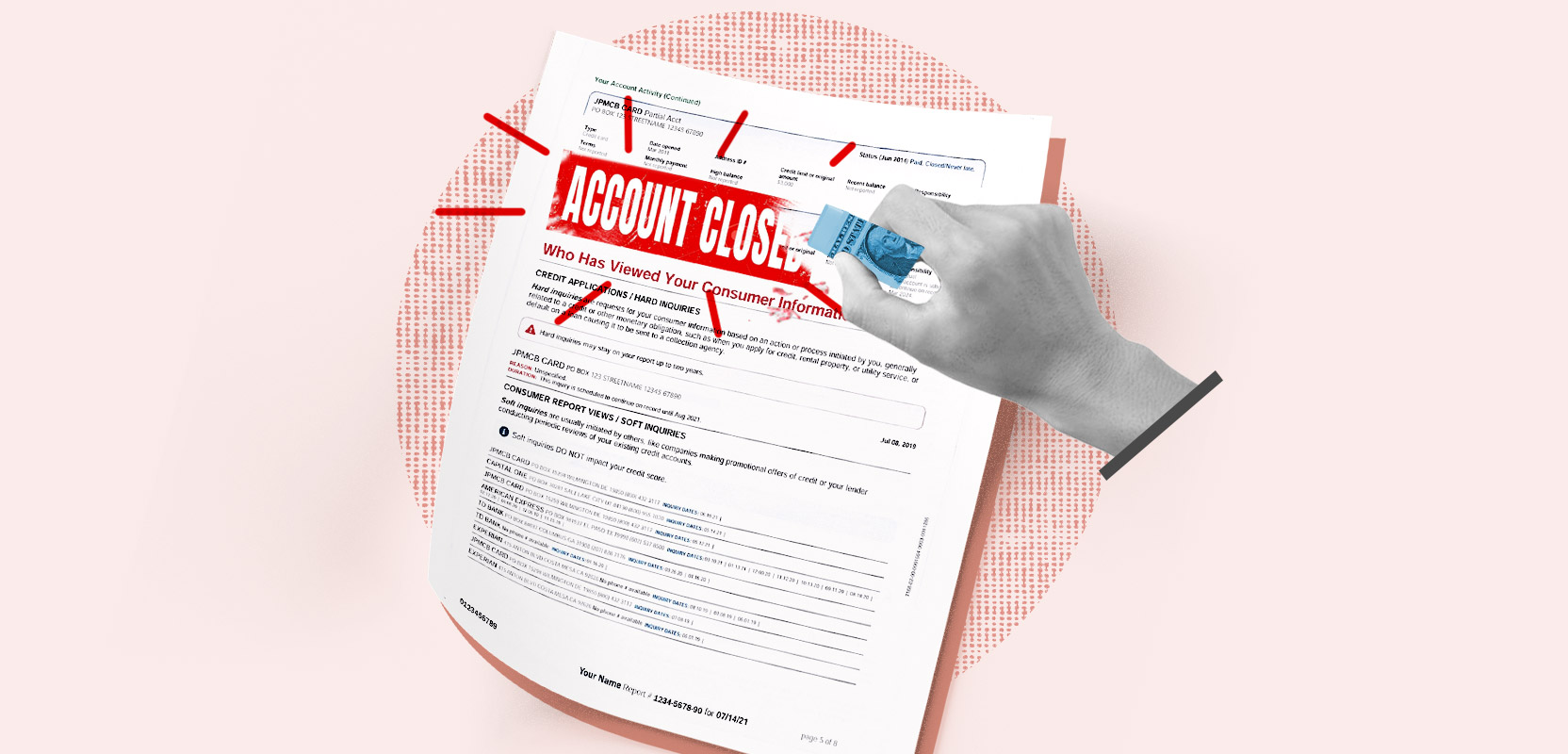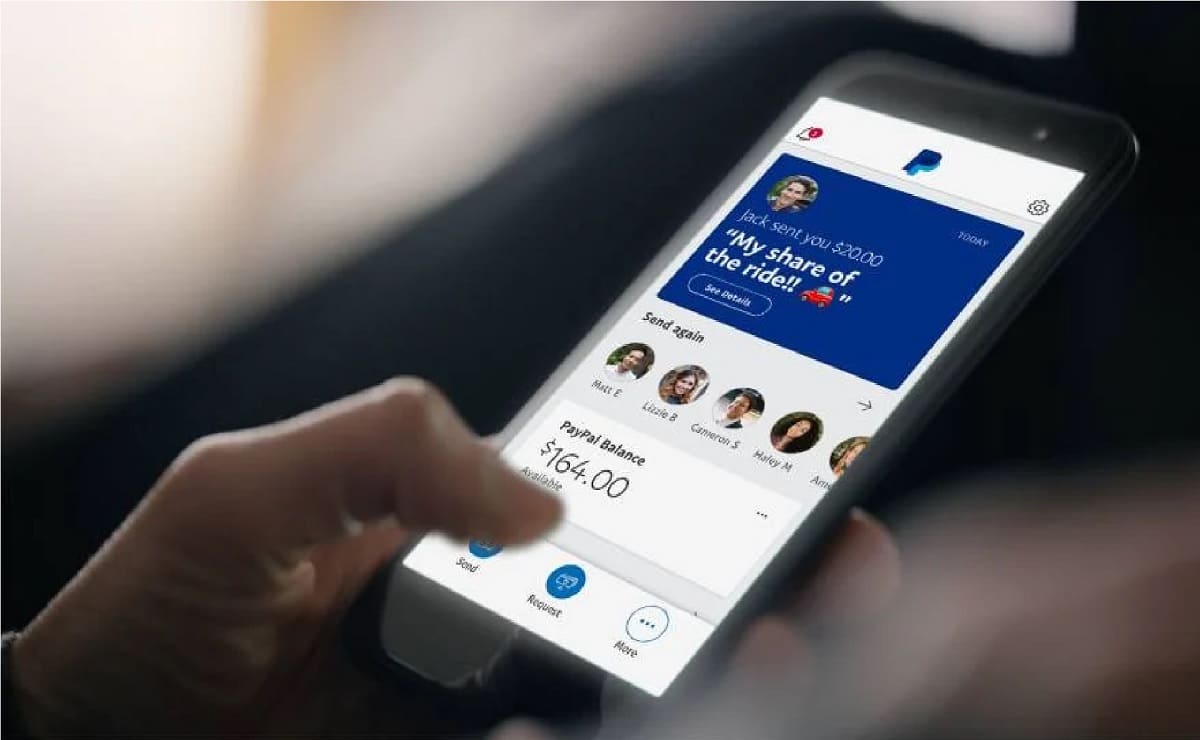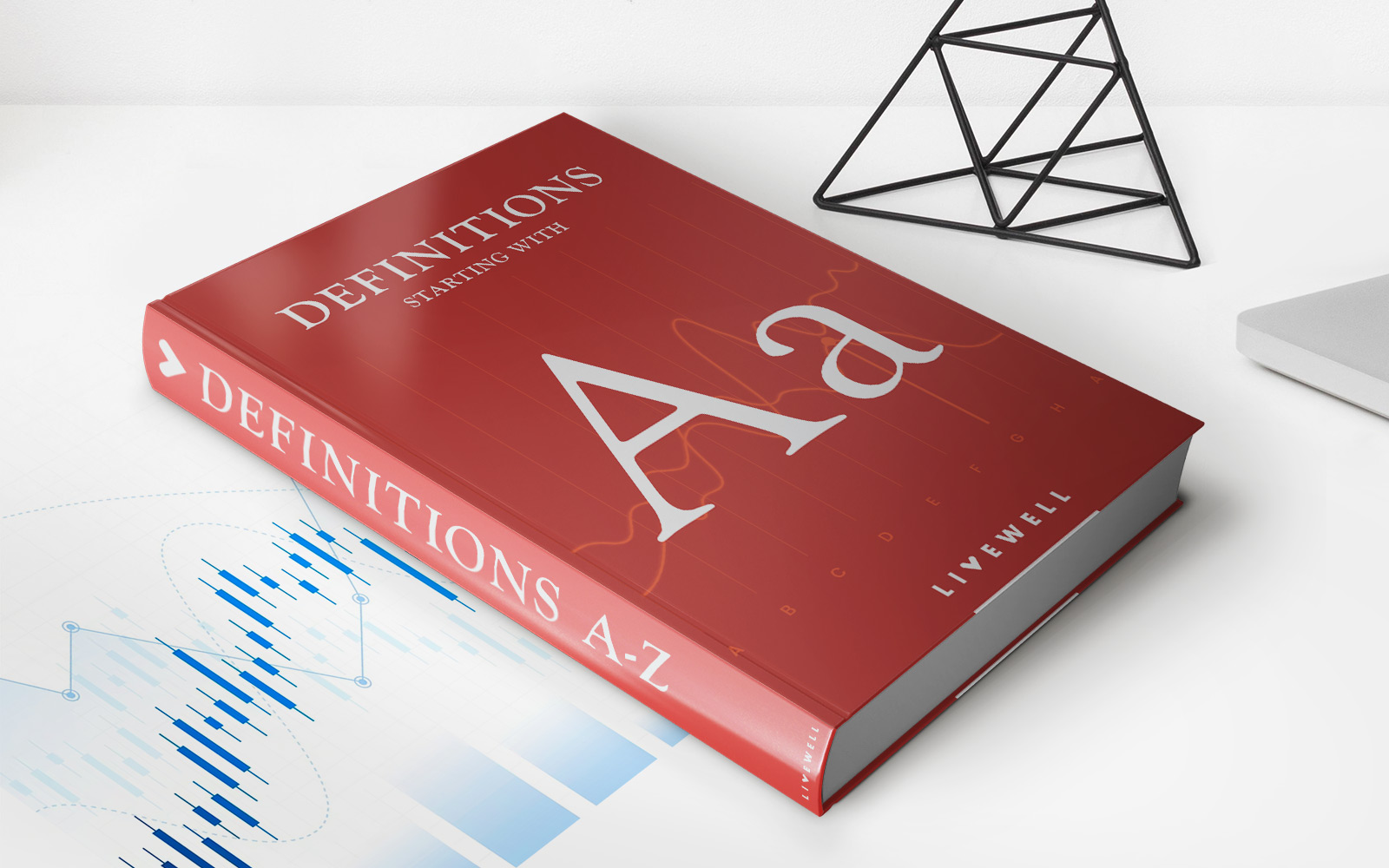

Finance
How To Get Closed Accounts Off Credit
Modified: March 1, 2024
Learn how to improve your credit score by removing closed accounts from your credit history. Get expert tips and advice on managing your finances.
(Many of the links in this article redirect to a specific reviewed product. Your purchase of these products through affiliate links helps to generate commission for LiveWell, at no extra cost. Learn more)
Table of Contents
- Introduction
- Understanding Closed Accounts
- Why Closed Accounts Appear on Credit Reports
- Negative Impacts of Closed Accounts on Credit Scores
- How to Check for Closed Accounts on Your Credit Report
- Steps to Remove Closed Accounts from Your Credit Report
- Reviewing Your Credit Report for Accuracy
- Disputing Closed Accounts with the Credit Bureaus
- Seeking Professional Help to Remove Closed Accounts
- Rebuilding Your Credit After Removing Closed Accounts
- Conclusion
Introduction
Welcome to the world of finance, where understanding the ins and outs of credit is crucial for your financial success. One particular aspect that can impact your creditworthiness is closed accounts. In this article, we will explore the various factors associated with closed accounts on credit reports and how they can affect your credit score.
But first, let’s clarify what we mean by closed accounts. Simply put, a closed account refers to a credit or loan account that you have previously used but is no longer active. This could be due to several reasons, such as paying off the debt in full, closing the account by choice, or the lender closing it due to default or non-usage.
It’s important to note that closed accounts can appear on your credit report and have an impact on your overall credit health. Understanding why they appear and how they can affect your credit score is crucial for maintaining a positive credit profile.
So, why do closed accounts appear on credit reports? The main reason is that credit reporting agencies, such as Equifax, Experian, and TransUnion, track your credit history and include all relevant information in your credit report. This includes not only your active accounts but also any closed accounts. The purpose of including closed accounts is to provide a complete picture of your credit history to lenders and creditors who might be considering your creditworthiness.
Understanding Closed Accounts
Before diving into the implications of closed accounts on your credit score, it’s essential to have a clear understanding of what closed accounts are and how they work.
A closed account, as mentioned earlier, is a credit or loan account that is no longer active. This means that you are no longer able to make new charges or borrow money from that account. However, it’s important to note that even though an account is closed, it still plays a role in your credit history and can have an impact on your credit score.
When you open a credit or loan account, the lender will report your account details, including the account opening date, credit limit, loan amount, and payment history, to credit reporting agencies. These agencies then include this information on your credit report, which serves as a record of your credit history.
When you decide to close an account, whether voluntarily or due to circumstances like paying off the debt or the lender’s decision, the account is marked as closed on your credit report. This closure is noted with a “closed” status, along with the date of closure.
It’s important to understand that closing an account does not automatically remove it from your credit report. Closed accounts can remain on your report for several years, typically up to seven to ten years, depending on the credit reporting agency and the type of account.
While closed accounts may not have an immediate impact on your credit score, they are still taken into consideration by lenders and can influence their perception of your creditworthiness. Therefore, it’s crucial to have a clear understanding of how closed accounts can affect your credit score and take the necessary steps to manage them effectively.
Why Closed Accounts Appear on Credit Reports
Understanding why closed accounts appear on credit reports can help you grasp their significance in evaluating your creditworthiness. While it may seem counterintuitive to have closed accounts included in your credit report, there are valid reasons for their presence.
Credit reporting agencies aim to provide a comprehensive overview of your credit history to lenders and creditors. Including closed accounts in your credit report helps create a complete and accurate picture of your creditworthiness. Lenders use this information to assess the level of risk associated with lending you money or extending credit.
One of the main reasons closed accounts appear on credit reports is to establish a track record of your credit management. By including closed accounts, credit reporting agencies can provide a detailed account of your past credit behavior, such as your payment history, credit utilization, and length of credit history.
Additionally, including closed accounts on credit reports serves as a way to identify any past negative financial events, such as defaults or bankruptcies. These closed accounts can serve as a reference point for lenders in determining your creditworthiness and the level of risk they are willing to assume.
Credit reporting agencies are also required by law to accurately report your credit history. This includes both active and closed accounts. The Fair Credit Reporting Act (FCRA) mandates that credit reporting agencies maintain accurate and complete information on consumers’ credit reports.
Another reason closed accounts appear on credit reports is to allow you to review your credit history and ensure its accuracy. By including closed accounts, you have the opportunity to verify the information reported by the credit bureaus. It gives you the chance to identify any discrepancies or errors that could affect your credit score.
It’s important to keep in mind that closed accounts, especially those with a positive payment history, can actually contribute positively to your credit score. Having a track record of responsibly managing credit, even if the accounts are closed, can demonstrate financial responsibility and improve your creditworthiness in the eyes of potential lenders.
Now that we understand why closed accounts appear on credit reports, let’s explore how they can impact your credit score.
Negative Impacts of Closed Accounts on Credit Scores
While closed accounts may seem harmless, they can have a significant impact on your credit score. Understanding these negative impacts is key in managing your credit effectively. Here are a few ways in which closed accounts can affect your credit score:
- Reduced credit utilization: Your credit utilization ratio is a crucial factor that makes up a significant portion of your credit score. It is the ratio of your total credit card balances to your total credit limit. Closing a credit card account can reduce your available credit, which in turn can increase your credit utilization ratio. A high credit utilization ratio can negatively impact your credit score.
- Shortened credit history: Length of credit history is another important factor in calculating your credit score. Closed accounts, especially those with a long history of on-time payments, contribute to the overall length of your credit history. When these accounts are closed, the average age of your accounts may decrease, potentially impacting your credit score.
- Loss of positive payment history: If you had a closed account with a history of consistent and timely payments, its closure means that the positive payment history associated with that account will no longer be active. Positive payment history plays a crucial role in determining your creditworthiness, and its loss can have a negative impact on your credit score.
- Impact on credit mix: Lenders and credit scoring models often consider the diversity of your credit mix when assessing your creditworthiness. Closed accounts, particularly those from different types of credit (e.g., credit cards, loans), contribute to a more diverse credit mix. When these accounts are closed, it can decrease the overall diversity of your credit mix and potentially impact your credit score.
- Overlapping negative information: Closed accounts with negative information, such as late payments or defaults, can continue to impact your credit score even after closure. Negative information remains on your credit report for a certain period, typically up to seven years, and can affect your credit score during that time.
It is important to note that the impact of closed accounts on your credit score can vary depending on various factors, such as your overall credit history, the status of other active accounts, and the reasons for the closure. Nonetheless, understanding these negative impacts can help you make informed decisions about managing closed accounts and mitigating their effects on your credit score.
How to Check for Closed Accounts on Your Credit Report
Checking your credit report regularly is essential for maintaining a healthy credit profile. When it comes to closed accounts, monitoring your credit report allows you to stay aware of any closed accounts and ensure their accuracy. Here’s how you can check for closed accounts on your credit report:
- Obtain your credit reports: Start by obtaining your credit reports from the major credit reporting agencies: Equifax, Experian, and TransUnion. You are entitled to a free copy of your credit report from each agency once every 12 months, as mandated by the Fair Credit Reporting Act (FCRA).
- Review your credit reports: Take the time to thoroughly review each credit report for any closed accounts. Look for accounts labeled as “closed” or “closed by consumer” or any other indication that the account is no longer active. Note the account details, such as the opening date, credit limit, and payment history.
- Verify account accuracy: Once you identify closed accounts on your credit report, ensure that the account information is accurate. Check for any errors, such as incorrect payment history, balances, or closing dates. Any inaccuracies can potentially impact your credit score.
- Check for negative information: Pay attention to any negative information associated with closed accounts, such as late payments or defaults. If you notice any inaccuracies or discrepancies, it’s crucial to address them promptly to protect your credit score.
- Take note of account status: Make a note of the status of each closed account. This can help you track the progress of any efforts to remove closed accounts from your credit report.
Remember that it’s important to check your credit reports from all three credit reporting agencies since the information reported may vary between them. By regularly reviewing your credit reports, you can ensure that closed accounts are accurately reported and take the necessary steps to manage them effectively.
Steps to Remove Closed Accounts from Your Credit Report
If you’ve discovered inaccuracies or discrepancies with closed accounts on your credit report, you have the right to dispute and potentially remove them. Here are the steps you can take to remove closed accounts from your credit report:
- Gather supporting documentation: Collect any documentation that proves the inaccuracy of the closed account information. This can include account statements, payment records, or any correspondence with the lender regarding the closure of the account.
- Write a formal dispute letter: Prepare a formal dispute letter addressed to the credit bureau that is reporting the inaccurate closed account. Clearly state the inaccuracy, provide details of the account, and attach any supporting documentation. Be sure to keep a copy of the letter for your records.
- Submit the dispute letter: Send the dispute letter via certified mail with a return receipt to ensure proof of delivery. This helps to establish a paper trail and ensures that the credit bureau receives your dispute within the appropriate timeframe.
- Wait for investigation: The credit bureau will initiate an investigation into your dispute. They will contact the lender to verify the accuracy of the closed account information. The investigation should be completed within 30 days, as mandated by the Fair Credit Reporting Act (FCRA).
- Review the investigation results: Once the investigation is complete, the credit bureau will send you a written response with the results. If the closed account information is indeed inaccurate, the credit bureau is required to remove it from your credit report.
- Follow up if necessary: If the credit bureau does not remove the inaccurate closed account information or if you are unsatisfied with the investigation results, you can escalate the dispute. This may involve providing additional evidence or filing a complaint with the Consumer Financial Protection Bureau (CFPB).
- Monitor your credit report: After resolving the dispute, continue monitoring your credit report to ensure that the closed account has been removed. It’s a good practice to regularly review your credit report to identify any new inaccuracies or discrepancies.
It’s important to note that not all closed accounts can be removed from your credit report. Accurate information, even if it reflects negatively, is typically not eligible for removal. However, if a closed account is reported inaccurately, taking these steps can help ensure its removal and the preservation of your credit score’s integrity.
Reviewing Your Credit Report for Accuracy
Reviewing your credit report regularly is a crucial step in maintaining a healthy credit profile. By reviewing your credit report, you can identify any errors, inaccuracies, or fraudulent activities that may be affecting your credit score. Here are some key steps to follow when reviewing your credit report for accuracy:
- Obtain your credit reports: Request a copy of your credit report from each of the three major credit reporting agencies – Equifax, Experian, and TransUnion. You are entitled to one free credit report per year from each agency.
- Check personal information: Start by verifying that your personal information, such as your name, address, and social security number, is accurately listed on the credit report. Any discrepancies could be a sign of identity theft or errors in reporting.
- Review account information: Go through each account listed on your credit report, both open and closed accounts. Verify that the account details, such as the account balance, credit limit, and payment history, are accurate. Any discrepancies or unfamiliar accounts should be investigated further.
- Confirm account statuses: Take note of the status of each account, particularly closed accounts. Ensure that closed accounts are correctly labeled as “closed” and reflect the date of closure. Incorrect status or closure dates can impact your credit score.
- Check for errors and inaccuracies: Carefully review your credit report for any errors or inaccuracies in the information reported. Look for incorrect payment history, late payments that you made on time, or accounts that do not belong to you. Dispute any such errors with the credit reporting agencies.
- Monitor credit inquiries: Pay attention to the section that lists inquiries into your credit history. Verify that you authorized each inquiry and report any unauthorized inquiries as potential fraudulent activity.
- Keep track of public records: If applicable, review any public records listed on your credit report, such as bankruptcies, tax liens, or court judgments. These records should be accurate and up to date. Dispute any incorrect or outdated information.
Remember, reviewing your credit report for accuracy is not a one-time task. It’s recommended to check your credit report at least once a year, if not more frequently. By regularly monitoring your credit report, you can identify and address any issues promptly, ensuring the accuracy of your credit history and protecting your credit score.
Disputing Closed Accounts with the Credit Bureaus
If you discover errors or inaccuracies regarding closed accounts on your credit report, it’s crucial to take action and dispute the information with the credit bureaus. The Fair Credit Reporting Act (FCRA) gives you the right to dispute any inaccurate or incomplete information on your credit report. Here’s how you can dispute closed accounts with the credit bureaus:
- Identify the discrepancies: Clearly note the specific inaccuracies or errors related to the closed accounts on your credit report. This can include incorrect account balances, payment history, or closure dates.
- Collect supporting documentation: Gather any supporting documentation that verifies the inaccuracies. This can include account statements, payment records, or correspondence with the respective lender.
- Write a dispute letter: Craft a formal dispute letter to the credit bureau(s) that are reporting the incorrect closed account information. Clearly explain the inaccuracies, provide account details, and attach the supporting documentation. Keep a copy of the letter for your records.
- Submit the dispute letter: Send the dispute letter via certified mail with a return receipt to the credit bureau(s). This ensures proof of delivery and establishes a paper trail. Credit bureaus are typically required to respond to disputes within 30 days.
- Investigation by the credit bureau: After receiving the dispute, the credit bureau initiates an investigation into the closed account inaccuracies. They contact the lender who provided the information and request verification or correction of the reported data.
- Review the investigation results: Once the investigation is complete, the credit bureau will provide a written response with the results. If the closed account information is found to be inaccurate, the credit bureau is required to remove or correct it on your credit report.
- Follow up if necessary: If the credit bureau does not resolve the dispute in your favor, or if you are unsatisfied with the investigation results, you can file a complaint with the Consumer Financial Protection Bureau (CFPB). Providing additional evidence or seeking legal advice may also be options.
- Monitor your credit report: After disputing the closed accounts, continue to monitor your credit report to ensure that any inaccuracies have been corrected or removed. Regularly checking your credit report can help you identify any new errors or discrepancies.
Remember, it’s important to be proactive in disputing closed accounts with the credit bureaus. Keeping accurate and up-to-date credit reports is crucial for maintaining a healthy credit profile and ensuring fair representation of your creditworthiness.
Seeking Professional Help to Remove Closed Accounts
If you’re facing challenges in removing closed accounts from your credit report or simply prefer to have professional assistance, seeking help from credit repair companies or credit counseling agencies can be a viable option. Here are some considerations and steps to take when seeking professional help to remove closed accounts:
- Research reputable credit repair companies: Take the time to research and identify reputable credit repair companies or credit counseling agencies. Look for organizations with positive reviews, credentials, and a history of assisting clients with credit-related issues.
- Understand services and fees: Review the services offered by the credit repair company or credit counseling agency, as well as their fees. Be aware that credit repair companies cannot guarantee the removal of accurate information from your credit report, and unethical practices should be avoided.
- Consultation and evaluation: Schedule a consultation with the chosen credit repair company or credit counseling agency. During the consultation, they will evaluate your credit situation, including the closed accounts on your credit report, and provide recommendations based on their expertise.
- Authorize credit analysis: Once you’ve selected a credit repair company, you will need to authorize them to perform a credit analysis on your behalf. This allows them to review your credit reports, identify inaccuracies, and develop a plan to address the closed accounts.
- Dispute assistance: The credit repair company will handle the dispute process with the credit bureaus on your behalf. They will send dispute letters, provide supporting documentation, and handle any communication with the credit bureaus throughout the process.
- Follow up and communication: Stay in regular contact with the credit repair company or credit counseling agency to track the progress of your case. They should provide updates on the status of your disputes and any actions taken to remove the closed accounts from your credit report.
- Monitor results: Continuously monitor your credit reports to ensure that the closed accounts are being removed or corrected as a result of the professional assistance. Remember that the ultimate responsibility for your credit health lies with you, so oversee the progress closely.
- Educate yourself: Take advantage of the opportunity to learn about credit management and improvement strategies from the professionals assisting you. Understanding how credit works and how to maintain a healthy credit profile will empower you in the long run.
While seeking professional help can be beneficial, it’s important to do your due diligence and carefully select a reputable and trustworthy credit repair company or credit counseling agency. Remember that you can also tackle the process of disputing closed accounts on your own, but if you prefer expert guidance, professional help can provide you with the necessary expertise and support.
Rebuilding Your Credit After Removing Closed Accounts
After successfully removing inaccurate or negative closed accounts from your credit report, it’s time to focus on rebuilding your credit. Rebuilding your credit is crucial for improving your creditworthiness and achieving a stronger financial foundation. Here are some steps to consider when rebuilding your credit:
- Establish a budget: Start by creating a realistic budget that allows you to effectively manage your finances. Assess your income, expenses, and debts to determine how much you can allocate towards debt repayment and savings each month.
- Make timely payments: Pay your bills, including credit card payments and loan installments, on time every month. Timely payments demonstrate responsible financial behavior and have a significant impact on your credit score.
- Reduce debt: Work towards reducing your overall debt load. Focus on paying down high-interest debts first, while making at least the minimum payments on all other accounts. Reducing your debt-to-income ratio can positively affect your credit score.
- Utilize credit responsibly: If you still have open credit accounts, use them responsibly. Keep your credit utilization ratio low by using only a small percentage of your available credit. Avoid maxing out credit cards or taking on unnecessary debt.
- Open new credit cautiously: If you find it necessary to open new credit accounts, do so cautiously. Apply for new credit sparingly and only when it’s necessary. Choose credit options that best align with your financial goals and ability to make payments on time.
- Consider a secured credit card or credit builder loan: If your credit score is low and you’re having difficulty obtaining traditional credit, consider options like secured credit cards or credit builder loans. These products can help you rebuild credit by establishing a positive payment history.
- Regularly check your credit report: Monitor your credit report regularly to ensure that it remains accurate and to identify any potential issues. You are entitled to a free credit report from each of the three major credit bureaus once every 12 months.
- Practice patience and perseverance: Rebuilding your credit takes time and patience. It’s important to stay committed to responsible financial habits and to persevere even when progress feels slow. Over time, your credit score will improve as you demonstrate consistent positive behavior.
Remember that rebuilding your credit is a gradual process that requires discipline and a commitment to responsible financial habits. By following these steps and maintaining good credit practices, you can rebuild your credit and improve your financial standing over time.
Conclusion
Understanding the impact of closed accounts on your credit report is crucial for maintaining a healthy credit profile and achieving financial success. Closed accounts, while no longer active, can still influence your credit score and overall creditworthiness. By reviewing your credit report regularly, identifying any inaccuracies or errors, and taking the necessary steps to remove or correct them, you can effectively manage closed accounts on your credit report.
Whether you choose to dispute the closed accounts on your own or seek professional assistance, it’s vital to be proactive in addressing any inaccuracies and ensuring the accuracy of your credit history. Timely action can help improve your credit score and provide a more accurate representation of your creditworthiness to lenders and creditors.
Rebuilding your credit after removing closed accounts is a process that requires patience, discipline, and responsible financial habits. Focus on making timely payments, reducing your overall debt, and utilizing credit responsibly to demonstrate your improved financial management skills. Over time, your credit score will improve, opening up doors to better financial opportunities.
Remember, your creditworthiness impacts various aspects of your financial life, from securing loans and credit cards to obtaining favorable interest rates. By staying informed, monitoring your credit report, and taking action when necessary, you can take control of your credit health and set yourself on the path towards a strong financial future.
Take charge of your credit today and make it a priority to manage closed accounts and maintain a positive credit profile. With the right strategies in place, you can overcome obstacles and achieve your financial goals with confidence.














